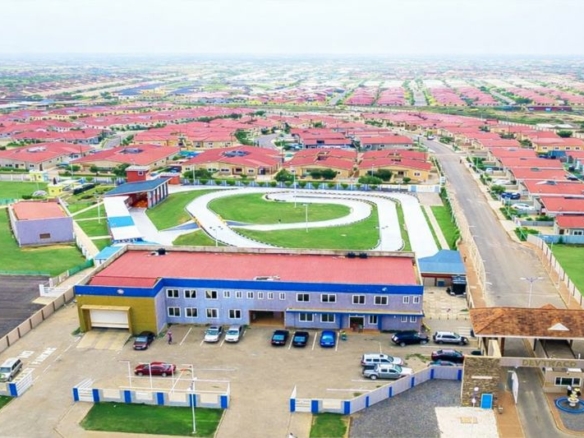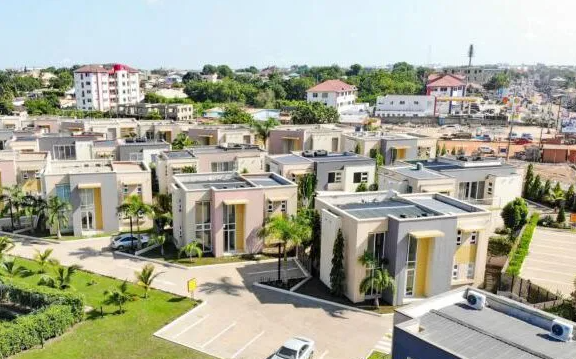AI predict future real estate prices in Ghana with revolutionary precision, transforming how investors, first-time buyers, and developers navigate the country’s dynamic property landscape. Advanced machine learning algorithms now achieve remarkable 87.6% accuracy in rental price predictions, revolutionising Ghana’s rapidly growing real estate sector.
Ghana’s property market presents unique opportunities and challenges. With the residential sector valued at US$513.30 billion and projected 3.53% annual growth through 2029, traditional valuation methods struggle with market transparency. Enter artificial intelligence – the game-changing technology reshaping property investment decisions across West Africa.
How do machine learning algorithms revolutionise property valuation in Ghana?
Machine learning transforms property assessment through sophisticated data processing capabilities. CatBoost and XGBoost algorithms achieve R² scores up to 0.99, dramatically outperforming conventional valuation methods. These systems simultaneously analyse property characteristics, location factors, economic indicators, and market trends.
Recent Ghana-specific implementations demonstrate impressive results. Research conducted using local datasets shows 87.6% accuracy rates for rental price predictions. The algorithms process multiple variables including property size, age, GPS coordinates, proximity to amenities, infrastructure developments, and economic factors like Ghana cedi exchange rate fluctuations.
Big data analytics enhances these models through real-time information processing from diverse sources. Property listings from platforms like Meqasa, government records from Ghana Statistical Service, infrastructure project data, and economic indicators from Bank of Ghana create comprehensive predictive frameworks addressing Ghana’s historical data limitations.
What benefits do AI price predictions offer different stakeholders?
First-time homebuyers gain unprecedented market transparency through AI-powered insights. Price discovery becomes straightforward, helping buyers identify fairly valued properties in markets where East Legon 2-bedroom homes increased from $120,000 to $220,000 between 2018-2024. AI systems provide affordability analysis, matching buyer financial capacity with suitable locations whilst reducing information asymmetry.
Property investors benefit from sophisticated portfolio optimisation and risk assessment capabilities. AI models predict rental yields ranging from 5-15% annually across different property types and locations. Predictive analytics identify emerging high-growth areas before significant market appreciation occurs, whilst automated valuation models enable rapid investment opportunity assessment.
Government urban planners leverage AI for evidence-based policy development and infrastructure planning. With Accra’s population projected to reach 3.6 million by 2035, AI systems provide crucial insights for affordable housing placement, accurate tax assessment, and strategic utility planning. Integration with Ghana’s National Property Data System enhances governmental decision-making capabilities.
Which proven examples demonstrate AI’s real estate forecasting success?
Estate Intel leads African PropTech innovation, operating across six countries with AI-driven market intelligence serving 120+ companies. Their automated property advisor “Vesper” provides real-time rental prices, yields, and market growth predictions through comprehensive property databases.
South Africa’s Lightstone achieved European AVM Alliance certification – the first African company reaching this prestigious standard. Used by five of six major South African mortgage lenders, their AI Automated Valuation Model processes 3.2 million+ property records with daily estimate updates.
Globally, AI adoption in real estate jumped from 36% to an expected 90% by 2030. Leading companies like Zillow achieve median error rates below 7.49% across 100+ million properties, generating $34 billion in industry-wide efficiency gains.
How can Ghana overcome AI implementation challenges?
Ghana faces specific challenges requiring targeted solutions. Data availability remains the primary constraint, with limited historical transaction records and fragmented information sources. Successful implementation demands partnerships between government agencies, real estate developers, and technology platforms.
Regulatory frameworks need development within the Real Estate Agency Council’s oversight structure. Ghana’s advancing digital infrastructure, including recent 5G network launches and the $200 million Digital Acceleration Project, provides essential technical foundations for AI deployment.
Algorithmic bias mitigation requires Ghana-specific training datasets incorporating local market characteristics, customary land ownership patterns, and cultural factors. Collaboration with the Ghana Real Estate Professionals Association ensures models reflect genuine market dynamics rather than imported assumptions.
What opportunities exist for enhanced market transparency?
AI systems create unprecedented market transparency through real-time data dashboards and standardised reporting mechanisms. Current market opacity, where 78% of land remains unregistered, transforms into automated fair value assessments and transparent pricing histories.
Infrastructure developments significantly impact AI predictions. Models must incorporate major projects like Accra SkyTrain’s 194-kilometre elevated railway, Eastern Corridor Road developments, and Agenda 111 hospital construction programmes affecting surrounding property values.
Technology providers demonstrate growing potential. Ghana Property Finder’s comprehensive listings and market insights position the platform perfectly for AI integration, enhancing search capabilities whilst providing predictive pricing intelligence for informed decision-making.
Ready to explore Ghana’s property market with cutting-edge insights? AI predict future real estate prices in Ghana represents the future of smart real estate investment, offering unprecedented accuracy and transparency for your next real estate decision.






